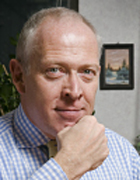As more people survive stroke, the burden of care and support is great and increasing. However, the implementation of guidelines, interventions and organized stroke care varies across Europe, contributing to variations of outcomes for stroke survivors.
The challenges are to go back to designing more effective ways of preventing stroke, said Prof. Charles Wolfe from King’s College London, the lead researcher of the Burden of Stroke Report.
King’s College London has been commissioned by the Stroke Association in the UK, on behalf of the Stroke Alliance for Europe, SAFE, to undertake a project on the burden of stroke and how patients’ needs are met by health care provision in Europe.

Image credit: King’s College London
Charles Wolfe is a Professor of Public Health at King’s College London. His research addresses epidemiological and health services research questions in stroke including estimating acute and longer term needs, the risk of stroke and chronic disease register methodology; and early supported discharge, secondary prevention, carer support and qualitative studies. With his colleague Dr Tony Rudd, he was the lead researcher for the Burden of Stroke White Paper, which was published in 2007.
Several factors motivate the requirement for the Burden of Stroke update. At the time of writing of the original 2007 report, there was no up to date, comprehensive assessment of the incidence, prevalence, mortality, or disability arising from stroke provided by many EU countries. Among other things, since the first report, there have been important changes and scientific advancements in stroke prevention and treatment.
It seems that we need a new overview of the health service culture and infrastructure around stroke for each target EU member state and several non-EU states represented in SAFE, in order to allow each country to see where it stands comparatively in terms of the demand from its population and its efforts to meet that demand. We spoke with Prof. Wolfe, who is the lead researcher of the Burden of Stroke update, about his passion for stroke related research, his opinion on stroke as a disease and challenges surrounding this topic.
SAFE: You dedicated a significant part of your professional life to stroke related research. The scope of your work covers very important issues, such as epidemiological and health services research questions in stroke, estimating acute and longer term needs, the risk of stroke and chronic disease register methodology, early supported discharge, secondary prevention, carer support and qualitative studies. What motivated you to engage so deep in stroke related topics? What make you so passionate about your work?
Prof. Wolfe: In the late ‘80s my boss, Professor Walter Holland at St Thomas’ Hospital London, had completed some very eye catching maps of ‘Avoidable Mortality’ for diseases around Europe and there were dramatic variations in risk of death that needed investigation, particularly for diseases such as stroke. Embarking in understanding risk of stroke and the natural history of stroke and how we treated people with stroke 30 years ago opened up a research and health and social care Pandora’s Box. There was very little known that was not really based on research in people with heart disease and basically we did not really have clear understanding of the needs of people with stroke and how to manage these needs effectively.
So I set up, with Stroke Association funding, population based registers in south east England to address some of these issues and then expanded these up across Europe in the mid-90s and since then I have continued with using population based data to inform policy, service provision and as a basis for trials of new interventions such as early supported discharge. I work with enthusiastic, optimistic people with stroke, researchers from many disciplines, managers and policy makers both in England and in the EU. Sustaining passion is not difficult as we have collectively as a stroke community achieved great things in the past 20 years and there is still so much to do, particularly around reducing risk and managing longer term needs of people with stroke and their families.
SAFE: After all these years in research, what is your personal opinion on stroke as a disease?
Prof. Wolfe: Stroke is increasingly seen as a long term condition with effective means of prevention and cure (in the first year post stroke), yet there are massive problems with implementing what we know works in the health and social cares systems across Europe. The challenges I think now are to go back to designing more effective ways of preventing stroke using the emerging knowledge from experimental medicine and the use of electronic health records to inform a better way of managing people holistically. We also do need to consider the multiple morbidities associated with stroke, such as diabetes, kidney disease, and how we best manage and promote self-management for stroke and other conditions more efficiently and effectively.
SAFE: Do you think we may conquer stroke in the next generation? What would we need in order to achieve that ambitious goal?
Prof. Wolfe: A generation is not a long time and the answer is no if you mean preventing stroke or curing all. This of course is not a reality for any condition. As I have said efforts in prevention need to take a leap forward but my hunch is it will not be down to for example genetics testing but using newer biomarkers and genetics to inform what we know already on stroke risk. With respect to acute care, yes professionals will become excited about new interventions such as trombectomy, but they will have only a very small population effect and will add to the cost pressures in European health systems. Longer term management may well best be considered as not a stroke specific issue but managing multiple morbidities and should be tackled with other researchers and clinicians in different specialties but particularly in primary care where much of the follow up occurs.
SAFE: Do you have people from your immediate surroundings who suffered from stroke?
Prof. Wolfe: I have no family members who have had a stroke. However, in south London we run a stroke register and have a very active patient and family group we meet with regularly around stroke research and services.





